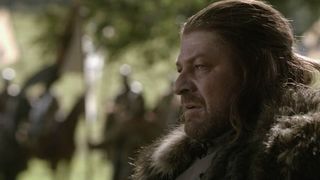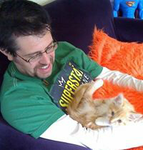In the first of a three-part series, SFX blogger Alasdair Stuart praises the actors who have brought the kingdom of Westeros to life

Winter is coming. It's a simple refrain and you hear it multiple times over the first episodes of Game Of Thrones . It’s also a perfect summation of the series itself, the desperate, epic, and ultimately futile struggles for power in a world where the seasons are changing, something terrible has awoken and the balance of power is shifting. Winter is coming and the only people who are ready are the ones who'll be doomed long before it arrives.
I don’t normally connect with fantasy particularly strongly, but Game Of Thrones hit me square between the eyes and it's taken me a little while to work out why. There are three things the series does that not only makes sure it’s as faithful as possible to the books it’s on which it’s based, but also make it as attractive to a new audience as possible. Together, they almost make a universal blue print for how to do series drama well. The first, the focus of this blog, is simple: cast actors and actresses that fit the roles.
There’s not a role I’ve seen to date in Game Of Thrones that’s miscast and I’ve rarely seen a better group of performances in one place. Front and centre amongst these is Sean Bean as Ned Stark, the lord of Northfell and a character who, superficially, is Boromir with a few years on him. Bean does this sort of quiet warrior role supremely well but here he brings something new to it; age. Ned Stark is just cresting past his prime, knows it and has settled down and made a life for himself. He’s raised his children well, loves his wife, is a good if stern Lord and has arguably the most valuable job in Westeros. When the King asks him to become the new King’s Hand, Ned knows exactly what it means and how little choice he has and goes anyway. He’s a good man in the wrong place and his family ultimately pay the price for that. The Stark family are equally impressive, with Michelle Fairley playing Lady Stark as every bit Ned’s equal. Their scenes are sweet, realistic and have a real sense of melancholy to them, providing the emotional heart to the huge series.
They’re not alone either, with Lena Headey, Nikolaj Coster-Waldau and Peter Dinklage completing the central set of impressive performances. Headey plays Cersei Lannister with a needlepoint combination of self-awareness and uncontrollable cruelty, whilst Coster-Waldau’s Jamie is a fascinating anti-hero. In the space of three episodes you find out not one but two awful things about Jamie, a third is strongly implied and yet, he’s one of the most entertaining characters to watch. He’s a Shakespearean figure made good or, to use the geek canon equivalents, Eric from Dungeons & Dragons or Rimmer from Red Dwarf with the ability, intelligence and savvy to make his talent for self-preservation truly terrifying.
It’s Dinklage, however, who steals the show as Tyrion Lannister, “The Imp”. Dinklage brings a fast, ready wit and an incredible calm to the show and, like Bean, he conveys huge amounts with his eyes. Tyrion, as he explains in a later episode, is always reading because he’s always thinking and that’s what’s kept him alive. Jamie has his sword, Cersei has the throne, Tyrion has his brain. His scenes are amongst the best so far, with the interplay between Tyrion and Jon Snow, Stark's illegitimate son a particular stand out. There’s some fascinating common ground between the two outsiders and together they almost make someone entirely new, the martial prowess and dutiful pragmatism of a Stark combined with the quick wit, intellect and ruthlessness of a Lannister.
Much like Westeros itself centres on a small amount of vital cities, the rest of the cast orbit around these vital roles. The Stark children, especially Maisie Williams as Arya Stark, the youngest daughter of the House of Stark. She’s intelligent, quick-witted and cheerfully violent and the scenes that close episode three, when she begins her lessons with swordmaster Syrio Forel, are amongst the best so far. Miltos Yerolemou gives the swordmaster the perfect combination of flamboyance and violence and there’s a clear hint, as episode three closes, that this is Arya’s true path, whether her father likes it or not.
There are numerous other performances that impress, ranging from Jason Momoa as the horse lord Khal Drogo and Aiden Gillen as Littlefinger to Emilia Clarke as Daenerys Targaryen, and together they form a genuinely coherent, huge and accessible fantasy world. These are real people, with real lives and flaws and failings and that makes the horror of the series' politics, and the growing and genuine horror beyond The Wall, all the more impressive.
Next time, we'll look at the design of the show and how that combines with the performances to further define the world.

